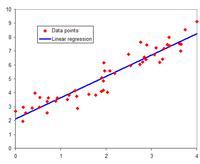
Photo from wikipedia
MOTIVATION Network-based analyses of high-throughput genomics data provide a holistic, systems-level understanding of various biological mechanisms for a common population. However, when estimating multiple networks across heterogeneous sub-populations, varying sample… Click to show full abstract
MOTIVATION Network-based analyses of high-throughput genomics data provide a holistic, systems-level understanding of various biological mechanisms for a common population. However, when estimating multiple networks across heterogeneous sub-populations, varying sample sizes pose a challenge in the estimation and inference, as network differences may be driven by differences in power. We are particularly interested in addressing this challenge in the context of proteomic networks for related cancers, as the number of subjects available for rare cancer (sub-)types is often limited. RESULTS We develop NExUS (Network Estimation across Unequal Sample sizes), a Bayesian method that enables joint learning of multiple networks while avoiding artefactual relationship between sample size and network sparsity. We demonstrate through simulations that NExUS outperforms existing network estimation methods in this context, and apply it to learn network similarity and shared pathway activity for groups of cancers with related origins represented in The Cancer Genome Atlas (TCGA) proteomic data. AVAILABILITY AND IMPLEMENTATION The NExUS source code is freely available for download at https://github.com/priyamdas2/NExUS. SUPPLEMENTARY INFORMATION Supplementary data are available at Bioinformatics online.
Journal Title: Bioinformatics
Year Published: 2020
Link to full text (if available)
Share on Social Media: Sign Up to like & get
recommendations!